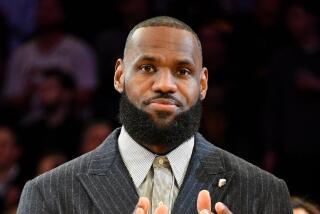He Sold Fame; We Bought It
- Share via
Believe it or not, there was a time not so very long ago when no one cared what pro athletes said they ate, drank, drove, wore or fed their cars. Now, they are everywhere, telling us how good a product is, even products for private male disorders.
These promotions don’t just happen. If you’ve ever seen any advertisement involving Michael Jordan (underwear, shoes, hamburgers, sport drinks), Arnold Palmer (motor oil), Rafael Palmeiro (that disorder), Yao Ming (credit cards), Derricke Cope (hair loss), Tiger Woods (seems like everything) or any professional athlete turned amateur actor out peddling stuff, then you’ve been touched by the industry that Mark McCormack pioneered.
He was the lawyer-turned-marketing- genius who invented the idea of paying pro athletes huge sums to endorse products and then, not accidentally, paying himself one of every four such dollars. That percentage will now flow into the $700-million estate of McCormack, who changed the sports business and what we see on TV before he died the other day of a heart attack at 72.
McCormack, a Chicagoan, founded and managed Cleveland’s International Management Group. From a handshake deal with Arnold Palmer that put the golfer atop a tractor and into his own clothing line, IMG went global, representing athletes to product makers as well as marketing entire athletic events like the Olympics and Wimbledon and creating made-for-television competitions like the Skins Game and “American Gladiators.”
What this son of a farm journal publisher realized first is that a prime purpose of television is the manufacture of fame, an invisible, ephemeral head-turning commodity that creates widespread instant recognition that can be leveraged lucratively. Banner ads in dime-store windows used to proclaim “As Advertised on TV!” as if buying commercial TV time made any product better. McCormack took athletes, many of whom competed for relatively small sums, got them on TV and basically morphed that fame into better-paying part-time sales jobs.
Two years after that 1960s Palmer-McCormack handshake, the pro’s $60,000 golf income had turned into $500,000 from endorsements. There were setbacks; IMG’s Seoul Olympics TV talks produced less money than expected. But McCormack expanded into new sports like surfing, even represented models, celebrity hairdressers and authors and produced a bestseller, “What They Don’t Teach You at Harvard Business School.”
The McCormack approach, widely copied by others on the scent of money, was so successful that many athletes’ huge sports salaries/winnings became a mere financial sideline. Tiger Woods, for example, might make about $7 million on the PGA Tour this year but earn up to $120 million on the ad circuit.
So now you know whom to blame during all those timeouts. Or why you need an agent.
More to Read
Go beyond the scoreboard
Get the latest on L.A.'s teams in the daily Sports Report newsletter.
You may occasionally receive promotional content from the Los Angeles Times.










